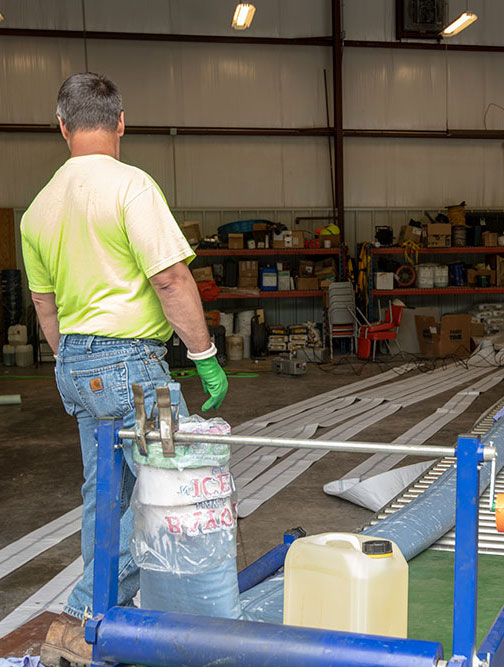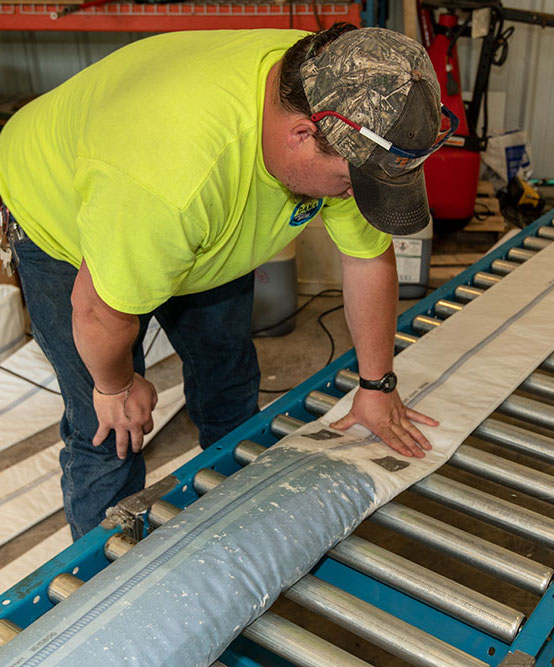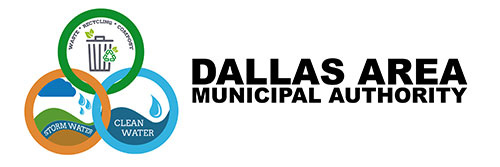On-Lot Septic
The Dallas Area Municipal Authority (DAMA) administers the provisions of the Pennsylvania Sewage Facilities Act (ACT 537) for the following municipalities: Dallas Borough, Dallas Township, Kingston Township, and Jackson Township.
Sewage Enforcement Officers (SEO), employed by, or acting on behalf of DAMA, are responsible for site testing, reviewing permit applications and sewage facilities planning modules, issuing permits as authorized by Act 537, and conducting complaint investigations and inspections that are necessary to implement the act and the regulations thereunder.
Outline of Permitting Process
I. Read the following information thoroughly. It is important and may help to avoid delays or possible problems that can occur during the permitting process. It is highly recommended that the applicant seek the services of a qualified consultant or contractor to assist you in the layout, design and construction of the on-lot sewage disposal system.
II. Come to the Dallas Area Municipal Authority office to complete the application. The cost of the application is $50.00. “Application for an On-Lot Sewage Disposal System Permit” (FORM ER-BWQ-290).
III. The Dallas Area Municipal Authority will forward the completed application to our Sewage Enforcement Officer to arrange required testing of your lot . The following tests must be completed before a permit can be issued:
A. Soil Probe/ Profile Test
- The applicant is responsible for having a backhoe on site on the date and time of the scheduled soil test, weather permitting. The applicant will be given at least 48 hours notice of the scheduled test date (if required).
- The soil probe/profile test will help determine if the lot is suitable for the installation of an on-lot sewage disposal system. Should the lot not meet the necessary standards, all monies from the deposit, less fees incurred to date will be refunded to the applicant.
B. Percolation Test
- The applicant is responsible for having the perc holes dug and prepared, and water on site on the date and time of the scheduled perc test, weather permitting. The applicant will be given at least 48 hours notice of the scheduled test date (if required).
- Approximately 100 gallons of water is required for the perc test. The preferred method is to use two 55 gallon drums with the tops removed, or three 30 gallon garbage cans full of water.
- Perc holes are to be dug and prepared in accordance with the “Percolation Test Hole Preparation” sheet provided with this application packet.
- The perc test will help determine the rquired size of the on-lot sewage disposal system. Should the lot not meet the necessary standards, all monies from the deposit, less fees incurred to date will be refunded to the applicant.
IV. Prior to the issuance of your on-lot system permit, a complete design must be submitted to this office for review by the SEO. After the design has been reviewed and the permit issued, the actual construction of your sewage disposal system may begin, following proper notification of our office.
NOTICE: The applicant is responsible for notifying this office/ SEO prior to the start of construction of the on-lot sewage disposal system. The following inspections are required during the construction of an Elevated Sand Mound type system:
- INSPECTION #1— When the proposed absorption has been chisel plowed.
- INSPECTION #2— When the sand bed is in place and leveled to +/- 2” per 100 ft.
- INSPECTION #3— When the distribution piping is in place and the system is ready to be pressure tested.
V. Lots contained as part of a subdivision of land which occurred after May 15, 1972 are required to have subdivision planning approval from the municipality and the Dept. of Environmental Protection. This is usually in the form of a letter containing a subdivision date and code, addressed to the original applicant. Prior to the issuance of your on-lot sewage disposal system permit, our office must be furnished with a copy of this letter or a statement from the applicant indicating the appropriate subdivision location, date and code.
VI. No structure may be occupied before the sewage system is finally inspected, approved and covered. Absorption area shall be covered by the permittee within 5-calendar days after final inspection and approval to prevent damage.
Complaint Investigation
The Sewage Enforcement Officer, acting under the direction of the DAMA Sewage Facilities Agency and pursuant to Section 8 of the Pennsylvania Sewage Facilities Act (ACT 537) and Section 72.42 of the Department of Environmental Protection’s Rules and Regulation, shall make inspections, enter lands, and abate nuisances as necessary during the course of investigation of a complaint of a malfunctioning on-lot sewage disposal system.
(Re: PA Code, Title 25, Chapter 72— Sect. 72.42 & Act 537 — Sect. 8, (b)(5))
1. Complaints may be received either directly by the local agency or referred to the local agency by DEP. Complaints may be received either in an anonymous or identified format.
2. Investigation of a complaint shall consist of the following steps:
- A) Contact of responsible property owner, whenever possible, and initial site investigation to confirm basis of complaint.
- B) Dye and Bacteriological testing of the site when the possibility of a surface malfunction exists.
- C) Photographs of the site of the malfunction and completion of a “Complaint Log Sheet.” A reference number will then be assigned to each complaint.
- D) Issuance of a Notice of Violation to the responsible property owner requiring the submission of a sewage permit application for the proper system repair.
3. When there are repeat complaints on a particular property and the local agency has already determined that a sewage problem does not exist, the SEO does not have to reinspect the alleged problem. A written response to the complaint shall be sufficient.
4. If the responsible property owner fails to take the required corrective action necessary to repair the malfunction, summary prosecution for a malfunctioning on-lot sewage disposal system may be brought by the municipality under the Clean Streams Law, the Sewage Facilities Act, or both. Section 602 of the Clean Streams Law provides for both summary offenses and misdemeanors for violations of the Act or the regulations. Similarly, Section 13 of the Sewage Facilities Act states that any violation of Section 7 of the Act or the regulations constitutes a summary offense. In either case, summary proceedings are initiated by use of a private criminal complaint or by the issuance of a citation by a police officer. (Re: Ch. 72, Sec. 72.42(13))


